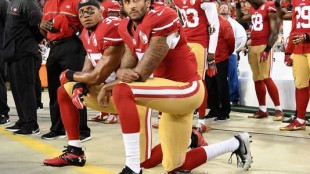How the Law Sees Kaepernick’s Protest
By Lee Henderson Colin Kaepernick’s decision to take a knee during the playing of the Star-Spangled Banner has sparked much conversation about the customs and legal rules expected during the National Anthem. While some take offense to the issues the back-up quarterback is kneeling for, most critics are offended by what they perceive as a disregard for the military members who fought and died for the flag (despite Kaepernick’s denial.) Since the Anthem’s first use in the early 1900’s, standing during it’s playing was a contentious issue. Following Hoover’s declaration that the Star-Spangled Banner be the country’s official national anthem in 1931, a poll revealed that public opinion was split as to proper behavior during the Anthem, half of respondents saying mandated standing was overly authoritarian. Congress weighed in on the issue when it passed 36 U.S.C. § 301, also known as the National Anthem Statute, which said that people should “face the flag and stand at attention with their right hand over their heart.” Although this still stands as law, no criminal penalties were ever prescribed in case of violation of the provisions. The Supreme Court also took its turn commenting on the status of these customs as they [read more]

